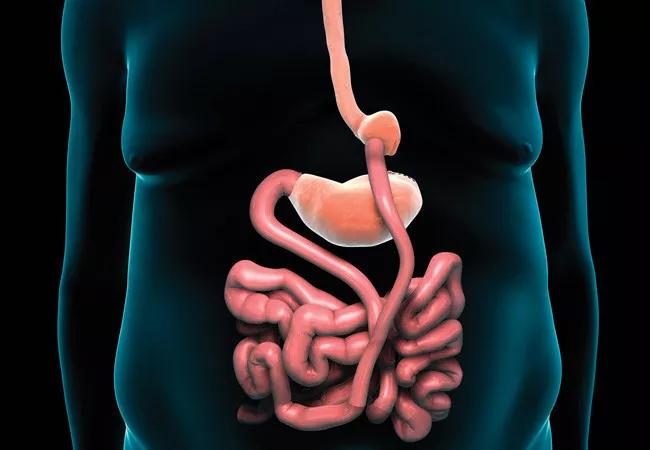Key cardiac biomarkers see favorable changes

A recent subanalysis of the STAMPEDE trial (for Surgical Treatment and Medications Potentially Eradicate Diabetes Efficiently) found long-term favorable changes in key cardiovascular (CV) biomarkers in patients with type 2 diabetes (T2D) who underwent bariatric surgery compared with those who had intensive medical therapy. Findings were presented at the 2018 Obesity Week Annual Meeting
Advertisement
Cleveland Clinic is a non-profit academic medical center. Advertising on our site helps support our mission. We do not endorse non-Cleveland Clinic products or services. Policy
“Earlier studies – more than 20 large observational studies – have indicated that bariatric surgery is associated with improved survival and a significant reduction in [CV] mortality in patients with obesity, compared to obese patients who didn’t get the surgery,” says Ali Aminian, MD, staff in the Section of Laparoscopic and Bariatric Surgery and an author on the study.
However, while researchers have known for some time that this decrease in CV mortality was associated with improvement in traditional risk factors such as diabetes status, lipid profile and blood pressure, other possible mechanisms for these findings have remained elusive, he says.
This analysis of the STAMPEDE trial addresses those underlying mechanisms. “With data from the STAMPEDE study we looked at novel markers,” he says. “This study is taking us beyond diabetes, hypertension and the lipid panel.”
It is furnishing more details to help researchers understand precisely why bariatric surgery is associated with a lower risk of CV diseases and events, explains Dr. Aminian. “Those new details are based on high quality data from a randomized clinical trial,” he notes.
The trial compared long-term cardio-metabolic changes in three groups of patients with type 2 diabetes, one group treated with intensive medical therapy (IMT), another with Roux-en-Y gastric bypass (RYGB) and another with sleeve gastrectomy (SG). It looked at 11 novel markers that are not routinely measured in clinical practice, but which may prove important for research.
Advertisement
Blood samples were available for 100 patients who had T2D (IMT N = 25, RYGB N = 39, SG N = 36) at baseline and five years after randomization.
Researchers analyzed 11 CV biomarkers in blood samples drawn from patients in all three groups. Four categories of biomarkers were examined: inflammation-related, lipoprotein-related, thrombosis-related, endocrine-related.
Patients who had undergone either form of weight-loss surgery showed favorable changes in C-reactive protein levels compared with patients who had IMT. Patients who had undergone RYGB had significantly better levels of both myeloperoxidase and interluekin-6 than those patients in the IMT-only group.
Of the three lipoprotein-related biomarkers (apolipoprotein-A, apolipoprotein-B, and lipoprotein (a)) evaluated, “Apolipoprotein-a improved significantly more after the surgery [than it did with just IMT],” says Dr. Aminian. The data analysis showed no significant differences in terms of changes in the other two biomarkers.
Thrombosis-related biomarkers included plasminogen activator inhibitor-1 and homocysteine. Plasminogen activator inhibitor-1 levels were favorably changed in patients who had received either type of operation, as compared with patients receiving medical treatment. The researchers found no significant differences in homocysteine levels between the study groups.
In endocrine biomarkers, levels of leptin and uric acid were significantly improved in patients who had RYGB surgery compared with medical treatment. Leptin was reduced to a significantly greater degree after RYGB than it was after SG. Changes in level of natriuretic peptide did not reach significance.
Advertisement
“These findings offer us some possible mechanisms to explain why we see cardioprotective effects of bariatric surgery,” says Dr. Aminian. They will also provide direction for continued research into the fundamental causes for the cardio-protective benefits of bariatric and metabolic surgery.
Advertisement
Advertisement

Benefits of neoadjuvant immunotherapy reflect emerging standard of care

Multidisciplinary framework ensures safe weight loss, prevents sarcopenia and enhances adherence

Study reveals key differences between antibiotics, but treatment decisions should still consider patient factors

Key points highlight the critical role of surveillance, as well as opportunities for further advancement in genetic counseling

Potentially cost-effective addition to standard GERD management in post-transplant patients

Findings could help clinicians make more informed decisions about medication recommendations

Insights from Dr. de Buck on his background, colorectal surgery and the future of IBD care

Retrospective analysis looks at data from more than 5000 patients across 40 years